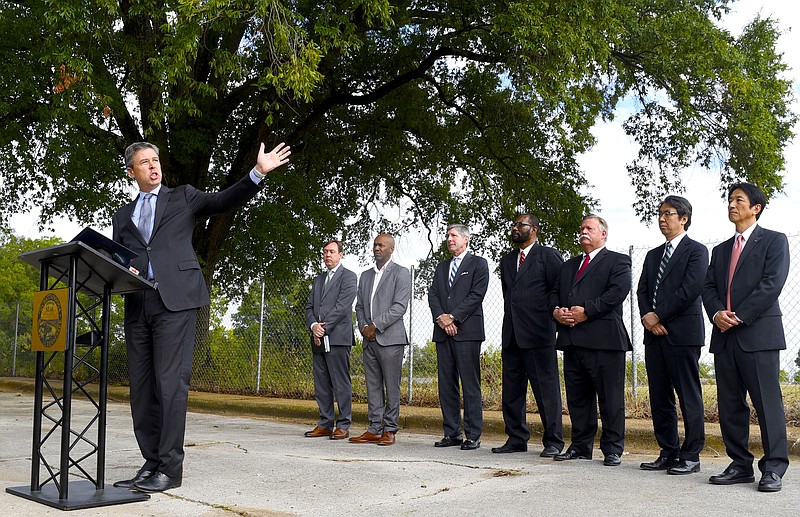Only months after taking office in 2013, Chattanooga Mayor Andy Berke was confronted with a decision. Should he let the former Harriet Tubman federal housing site be purchased, perhaps patched and then reopened to what promised to be a crowded, less-than-ideal, subsidized homes complex?
Or might the city purchase the property and do something far more helpful for the neighborhood?
With 72 buildings boarded up and dilapidated, Berke said, the message already was that the government didn't care.
So, although the $2.6 million deal took months to complete, the choice was easy - though complex. The sale closed in 2014.
Berke's goal from the start was jobs, jobs for those who lived close by, jobs for those who lived in Avondale and East Chattanooga.
"If you can earn a living right around the corner from where you live," he said, "it can change your life."
Indeed, the jobs - he foresaw them in light manufacturing - would be walkable for some.
In the process of razing scores of buildings on 45 acres at a cost of $4.3 million, Berke sought the community's opinion. What did residents envision? How did their dreams mesh with his goal of bringing jobs to the area? In at least 14 meetings, the possibilities were discussed.
Neighborhood leaders, Berke told Times Free Press editors last week, shared his idea for good, nearby jobs.
The problem was, the mayor said, the new occupant couldn't be just anyone. Dead end jobs wouldn't do anything for the community.
"I always knew we needed the right fit," he said.
As it turned out, that took time, time that raised grumbling from a few loud voices on the periphery of the neighborhood. At least 10 perspective buyers were taken to the site over the last half decade, but either they didn't want to make the commitment or weren't the right type of employer.
Nevertheless, Berke said, "I never had a concern it was the wrong thing to do."
In the meantime, the city built a new Avondale Youth and Family Development center for the community, invested in sidewalks for the burgeoning Glass Street area and made serious infrastructure upgrades to the nearby Wilcox Tunnel. And in January, based on what the administration had heard from potential buyers, the Chattanooga City Council rezoned the property to afford the type of manufacturing the mayor had in mind.
Finally, Monday's announcement that Nippon Paint Co., one of the world's biggest paint and coatings companies, would make a $61 million investment on 30 acres of the property - good for an eventual 150 jobs within five to seven years - was the ideal situation Berke had been waiting for.
Only when economic development and community development go together, he said, can things truly improve.
The company will make automobile paint at the 270,000-square-foot plant, which will be an environmentally friendly, LEED (Leadership in Energy and Environmental Design)-certified building. It also will include space for training programs and research and development.
Jobs at the company - which chose Chattanooga among four finalists across the South - will include those of higher paying chemists but have an average pay of $22.63 per hour. And some will offer a career-ladder path.
Berke and Charita Allen, deputy administrator for economic development for the city, also spoke of the company's environmental conscience and the regulations it automatically must meet. They said due diligence had been done on the company over such concerns.
"They showed us what they've done," he said. "Their record is very good."
Nippon, a 138-year-old company based in Osaka, Japan, also will pay all of its city and state taxes, though it will take advantage of a $1.1 million state FastTrack Grant for infrastructure improvements and TVA incentives.
What's more, said Berke, "they like to be in neighborhoods. That's the reason they want to be there."
In turn, he said, neighborhood leaders who learned of the investment were "in ecstasy."
The last large investment in the area, Berke said, had been a hosiery mill in 1917, 102 years ago.
The investment, he said, will come in two phases. The first will begin in and is expected to be completed in late 2020, or in early 2021, when it will be able to supply a new automobile plant in Huntsville, Alabama, that will manufacture Toyotas and Mazdas. After a break of undetermined length, a second phase will begin.
To date, the city has spent $9.5 million on the property, including an already budgeted but not completed $2 million sewer line relocation. In return, it will have a $61 million investment, 150 jobs, tax revenue and 15 acres that can still be developed.
In our mind, that's a good return for the city on its money and one that's even better because it is a good fit for a community that hasn't seen significant investment in many years.
